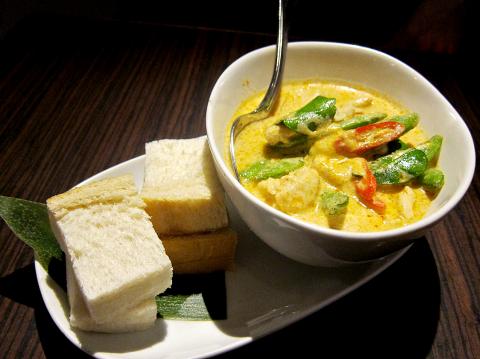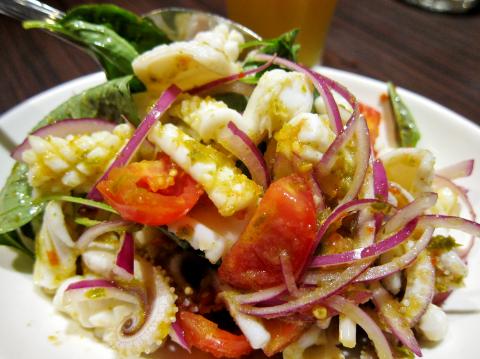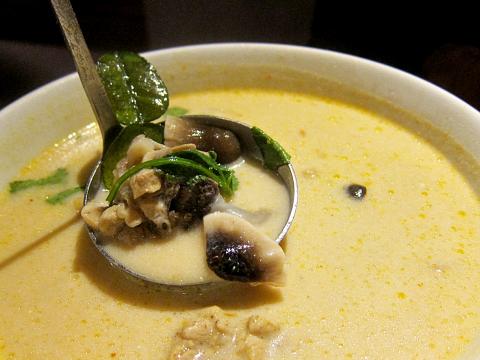Jolly offers up an unusual but tantalizing combination of Thai food and beer from the restaurant’s microbrewery. The eatery has two locations, one in Neihu and the other on Qingcheng Street (慶城店) near the Nanjing East Road MRT Station (南京東路捷運站). This review is for the latter.
The restaurant prides itself on serving food and drinks with its own signature combination of flavors. Jolly says its take on Thai cuisine emphasizes the use of Thai spices and herbs to create a balance between tangy and spicy flavors, while its beers combine European and American brewing methods.
My dining companion said that Jolly’s pale ale, one of its regular offerings, was not too sweet nor too bitter, but also did not stand out from other pale ales he had sampled before. The pilsner, which he had on a previous visit, is a good choice for people who like dry, slightly sweet beer. (Beers range from NT$110 for a 250ml glass to NT$350 for 800ml).

Photo: Catherine Shu, Taipei Times
Jolly’s current drink special is passionfruit witbier (wheat bear) made from a blend of barley malts with unmalted wheat and oats. Passion fruit is added during the first fermentation. The juice’s acidic flavor adds a gentle but tart kick to the witbier’s honey-like aroma and crisp, yeasty flavor.
The light, slightly sweet beer paired very well with the spicy squid salad (NT$280), made with squid, basil, cherry tomatoes and red onion gently tossed with a mixture of jalapeno peppers, fish sauce and lemon juice. The texture and taste of the crisp red onions and vinegary cherry tomatoes was a toothsome contrast to the tender but firm slices of squid.
Like the spicy squid salad, crab fried rice (NT$270) can be found on the menus of many other Thai restaurants, but Jolly’s version stands out by not being too greasy and having plenty of fat crab claw meat. It is stir-fried with just enough green onion slices and fluffy scrambled egg to make the dish hearty without being too heavy. Slices of dried seaweed and diced fresh cucumber are served on the side to sprinkle on top of the rice for a bit of crunch.

Photo: Catherine Shu, Taipei Times
All the classic Thai curries — red, green and yellow — appear on Jolly’s menu, and are thick, rich and creamy without being cloying.
Filled with fresh, crunchy snap peas and potato, our yellow curry chicken (NT$275) was served with thick white bread slices for dipping. The sweet coconut milk was offset by plenty of very hot cayenne pepper.
My favorite course of the evening was our chicken with coconut milk soup (NT$300). Served piping hot in a tureen with enough soup for four people, it is made with dark chicken meat still on the bone, galangal, lemon grass and kaffir lime leaves stewed in lemon juice and coconut milk. The smooth, creamy broth has a wonderful, satisfying array of flavors and aromas.

Photo: Catherine Shu, Taipei Times
The interior of Jolly’s Qingcheng Street location is furnished like a sports bar, with heavy dark wood furniture and a small TV screen mounted next to each table that broadcasts games and sports news. The well-lit space is family friendly, however, and there is a patio that faces onto the road for warm weather dining.

Beijing’s ironic, abusive tantrums aimed at Japan since Japanese Prime Minister Sanae Takaichi publicly stated that a Taiwan contingency would be an existential crisis for Japan, have revealed for all the world to see that the People’s Republic of China (PRC) lusts after Okinawa. We all owe Takaichi a debt of thanks for getting the PRC to make that public. The PRC and its netizens, taking their cue from the Chinese Communist Party (CCP), are presenting Okinawa by mirroring the claims about Taiwan. Official PRC propaganda organs began to wax lyrical about Okinawa’s “unsettled status” beginning last month. A Global

Taiwan’s democracy is at risk. Be very alarmed. This is not a drill. The current constitutional crisis progressed slowly, then suddenly. Political tensions, partisan hostility and emotions are all running high right when cool heads and calm negotiation are most needed. Oxford defines brinkmanship as: “The art or practice of pursuing a dangerous policy to the limits of safety before stopping, especially in politics.” It says the term comes from a quote from a 1956 Cold War interview with then-American Secretary of State John Foster Dulles, when he said: ‘The ability to get to the verge without getting into the war is

Dec. 22 to Dec. 28 About 200 years ago, a Taoist statue drifted down the Guizikeng River (貴子坑) and was retrieved by a resident of the Indigenous settlement of Kipatauw. Decades later, in the late 1800s, it’s said that a descendant of the original caretaker suddenly entered into a trance and identified the statue as a Wangye (Royal Lord) deity surnamed Chi (池府王爺). Lord Chi is widely revered across Taiwan for his healing powers, and following this revelation, some members of the Pan (潘) family began worshipping the deity. The century that followed was marked by repeated forced displacement and marginalization of

Music played in a wedding hall in western Japan as Yurina Noguchi, wearing a white gown and tiara, dabbed away tears, taking in the words of her husband-to-be: an AI-generated persona gazing out from a smartphone screen. “At first, Klaus was just someone to talk with, but we gradually became closer,” said the 32-year-old call center operator, referring to the artificial intelligence persona. “I started to have feelings for Klaus. We started dating and after a while he proposed to me. I accepted, and now we’re a couple.” Many in Japan, the birthplace of anime, have shown extreme devotion to fictional characters and